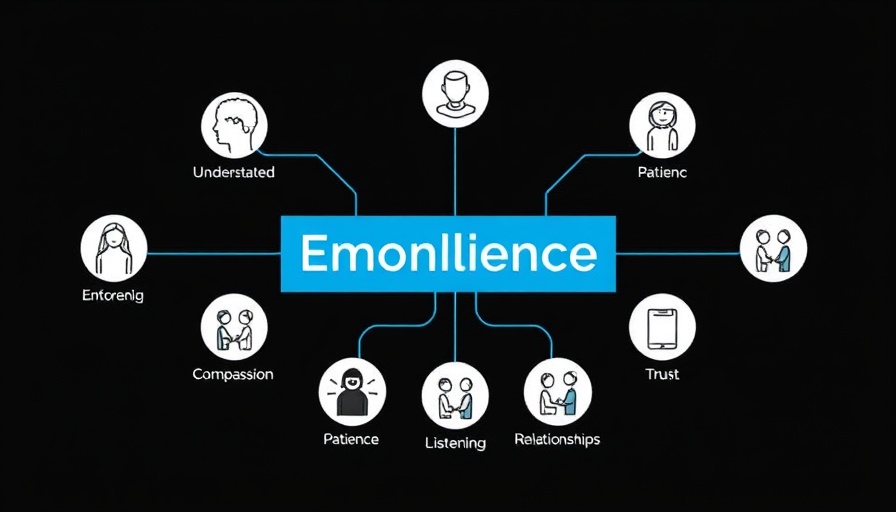
Unlocking Leadership Potential: The Power of Emotional Intelligence
In today’s fast-paced business landscape, effective leadership is not just about making decisions; it’s about understanding people. This is where emotional intelligence (EI) comes into play, reshaping how leaders engage with their teams. Emotional intelligence encompasses the ability to recognize and manage one’s own emotions, as well as those of others. Daniel Goleman’s foundational work on this topic illuminated the importance of EI, suggesting that it can often outweigh IQ in leadership success.
Why Emotional Intelligence Matters in Business
Leaders with high emotional intelligence are better equipped to foster collaboration, inspire trust, and create a positive organizational climate. Research consistently highlights the connection between EI and workplace performance. A study from TalentSmart reveals that a staggering 90% of top performers possess high emotional intelligence. Companies that prioritize EI see tangible results, including a 21% increase in profitability as noted in Gallup’s findings on employee engagement.
But why is this emotional capacity so valuable? First, it enhances communication. Leaders attuned to emotional cues can respond to their team’s needs more effectively, cultivating trust and stronger relationships. Second, it helps manage stress. High-EI leaders maintain composure during challenges, which provides a stable environment that encourages productivity.
Empathy: A Cornerstone of Effective Leadership
At the heart of emotional intelligence lies empathy—the ability to understand and share the feelings of others. Leaders who practice empathy not only strengthen their relationships with team members but also build a culture of appreciation and motivation. Employees who feel understood are more likely to be engaged and committed to the organization’s objectives. This supportive atmosphere can lead to higher retention rates and enhanced team dynamics, which are crucial for sustainable growth.
Exploring the Best Emotional Intelligence Books for Leaders
For those looking to enhance their emotional intelligence, various resources are available. Here are six insightful books that aspiring and established leaders should consider:
- Emotional Intelligence by Daniel Goleman - The seminal book that introduced the concept of emotional intelligence and detailed its relevance in personal and professional success.
- Beyond Order by Jordan B. Peterson - This book provides guidance on navigating chaos with responsibility and clarity, emphasizing the importance of mental resilience.
- HBR’s 10 Must Reads on Emotional Intelligence by Harvard Business Review - A compilation of pivotal articles providing insights into EI and its practical applications in the workplace.
- The Emotionally Intelligent Manager by David R. Caruso and Peter Salovey - This guide breaks down the applications of emotional intelligence in managerial roles, backed by research and practical advice.
- Primal Leadership by Daniel Goleman, Richard Boyatzis, and Annie McKee - A transformative read that explores how leaders can shape organizational culture through emotional intelligence.
- Emotional Intelligence 2.0 by Travis Bradberry and Jean Greaves - This book offers detailed strategies for improving your EI, along with a self-assessment tool to track progress.
Transforming Leadership Styles Through Emotional Intelligence
Understanding and applying emotional intelligence can lead to profound changes in leadership styles. Leaders who actively cultivate these skills can make more informed decisions, resolve conflicts effectively, and communicate with their teams in a way that resonates. As we move towards a more empathetic and responsive business culture, prioritizing emotional intelligence becomes increasingly essential.
Moving Forward: Steps Towards Emotional Intelligence Development
Improving emotional intelligence isn’t an overnight task; it requires consistent self-reflection and practice. Leaders can start by seeking feedback from their peers, engaging in active listening, and being open about their emotional experiences. Encouraging a culture of emotional awareness within teams can also foster a stronger collective intelligence that benefits the entire organization.
Conclusion: Invest in Your Leadership Journey
In summary, emotional intelligence is a critical asset for today’s leaders. By enhancing communication, building strong relationships, and managing stress effectively, leaders can create thriving workplaces. Dive into these pivotal books on emotional intelligence to discover how to leverage these insights for your growth and organizational success.
 Add Row
Add Row  Add
Add 




 Add Row
Add Row  Add
Add 

Write A Comment